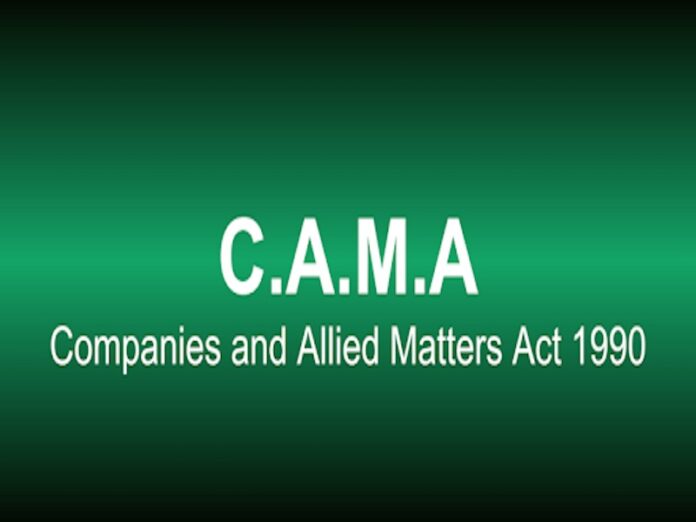The Companies and Allied Matters Act (CAMA) 2020 now permits electronic share transfer and private companies can now hold their general meetings virtually, Head of Legal, Compliance & Governance of Advans Lafayette Microfinance Bank Limited, Jennifer Halim-Ubahakwe has said.
She said the new CAMA is Nigeria’s most significant business legislation in three decades and it introduces new provisions that promote ease of doing business and reduces regulatory hurdles.
Explaining the revision of CAMA on MSMEs in Nigeria, Halim-Ubahakwe, a seasoned lawyer whose repertoire spans the practice of Corporate Commercial Law, Corporate Governance and Commercial Dispute Resolution, said satraps are the biggest beneficiaries of the CAMA 2020.
Speaking on the impact of the Reduction of Filing Fees for Registration of Charges for those aspiring to register their businesses in Nigeria, she states that this provision introduces a significant reduction in the fees payable for the registration of charges.
It is a good incentive for potential and established businesses in Nigeria especially for those in the lending market as it saves cost and allows for ease of doing business.
Prior to the repeal of CAMA, 2004, the fees for filing and registration of charges as applicable to both private and public companies were N10,000 on every N1,000,000 (1 per cent) and N20,000 on every N1,000,000 (2 per cent) respectively.
By section 222 (12) of the new CAMA, 2020, the total fees payable to the Commission with respect to the filing, registration or release of a charge with the Commission shall not exceed 0.35 per cent of the value of the charge or such other amount as the Minister may specify in the Federal Government Gazette.
Under the new CAMA, The Business Rescue makes provisions to protect MSMEs from being declared bankrupt. The Act introduces a framework for rescuing a company in distress and to keep it alive which gives some assurance and comfort to founders and investors as against allowing such entity to become insolvent. SMEs can leverage on the Company Voluntary Arrangement and the Administration provisions of the new Act.
Under Company Voluntary Arrangement, the Directors may make a proposal to its creditors for a negotiated arrangement towards the satisfaction of its debt or a scheme of arrangement of its affairs to prevent the Company from being wound up.
By the said proposal, a nominee who is a qualified Insolvency Practitioner is appointed to act as a Trustee to supervise the implementation of the arrangement. This process can also be initiated by a Liquidator or an Administrator where the Company is in liquidation or administration.
Administration is a business rescue procedure. Here, an Administrator of a Company may be appointed by the Court, a holder of a floating charge, a Company or its Directors. Unlike the onerous situation under the old CAMA where Administrators overtook the operations without attempts at resuscitating the company, the Act imposes a duty on administrators to perform their functions to rescue the company and retain its undertakings as a going concern where it is practical to do so.
More than ever, these provisions are bound to boost investor confidence, improve the ease of doing business and expand Nigeria’s business worldview to align with international best practice. Creditors are also more likely to opt for one of the business rescue options, rather than liquidation, in the hope that they would realize better returns than if the company were to be wound up.
The new CAMA makes provision for electronic filing and e-meetings for private companies, thus businesses can now carry out their required filings with the Corporate Affairs Commission (CAC) electronically through CAC’s e-registration portal; and the Certified True Copies of filed documents are, admissible in evidence.
Electronic share transfer is now permitted and private companies can now hold their general meetings virtually in line with the Company’s Articles of Association with the exception of small companies and companies with a single shareholder. This will facilitate participation at such meetings from any location and would considerably cut down cost.
To take advantage of these innovations, MSMEs are encouraged to regularize their documentation at CAC to align with the new Act and utilize the relevant electronic platforms for more efficient business operations.
Speaking on the implication of the introduction of Limited Liability Partnerships (LLP) as a new corporate structure, she quips that an LLP is a perfect corporate structure for business ventures between individuals or corporate bodies that would not require equity capital raising. Where the intention is to raise equity finance, it is best to register a limited liability company, and ensure strict compliance with all corporate governance requirements.
LLP combines flexibility and tax status of a partnership with the status of limited liability for members of a company. This implies that the partners of an LLP are not personally liable directly or indirectly by virtue of being partners of the LLP; rather, such liabilities are met with the assets of the LLP.
However, according to the Act, instances where the LLP or any of its Partners’ Act with the intent to defraud creditors of the LLP or any other person, the liability of the LLP and partners who acted in that manner shall be unlimited for all or any of debts or other liabilities of the LLP.



